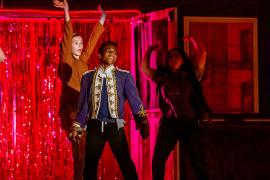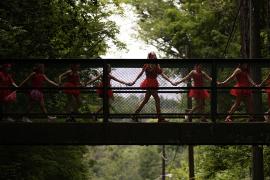An Interview with Camp Southern Ground President Rob Parker
When GRAMMY Award-winning musician Zac Brown began the journey of realizing his vision to build Camp Southern Ground, a nonprofit camp, from the ground up, he turned to Rob Parker — his CEO for parent company Southern Ground, who is responsible for oversight of Zac Brown Band's lifestyle brand and philanthropic efforts. Bringing more than 30 years of experience in organizational leadership to the table, as president of Camp Southern Ground, Parker has the added responsibility of providing leadership and raising capital for the camp. It's a role he gladly took on because, like Zac Brown, he knows firsthand the life-changing power of camp and believes for kids from all backgrounds and abilities who have the opportunity to learn and grow through the camp experience, it is hallowed ground.
Tell us a little bit about Camp Southern Ground.
The goal at Camp Southern Ground is to create unforgettable outdoor experiences for children of all backgrounds and abilities. While the camp is for all children, it has a special focus on young people with neurobehavioral challenges, at-risk populations, and children from military families. Part of the magic of Camp Southern Ground is the integration of children who are uniquely gifted with typically developing children. Over the course of a week of working together as a team, campers of all abilities end up learning to appreciate and accept the differences they see and experience in others. When it's time to go home, children that were once fearful or disrespectful of a child with autism, or some other social-behavioral challenge, are now their friends and advocates. It truly is a remarkable transformation.
What was the inspiration behind starting Camp Southern Ground?
This comes out of Zac's personal experience as a camper and a camp counselor. His camp experience was a key driver in his personal development as a person and a leader. It has been his dream to do this since he was a camp counselor. It's not a side project for Zac, not something he thought of after he was successful. This idea was hatched long before his first number one song. He honestly believes in the motto "You Get What You Give" (the name of his second major studio album). It's his understanding of why God's blessed him with what he has. Zac truly believes that if you start by giving first, you will get back more than you ever give away.
In his personal experience as a camp counselor, Zac was assigned the responsibility of integrating kids with special needs into the main camp (at Camp Glisson in North Georgia). He also believes deeply in the incredible leadership development opportunities that camp provides for counselors, staff, and volunteers. For him, it's multilayered; he's investing in children and parents as well as the young people who lead and serve. From his own personal experience, Zac knows these counselors will never look at the world the same, and that many will decide to help make the world a better place.
How are you using Zac's platform to help kids and get the word out about camp?
Zac has a huge megaphone, and he is not shy about using it on the stage every night. He shares a portion of every ticket that his fans purchase, donates millions of his own money, and invites everyone who is interested to join the cause. He also talks about the camp in radio and TV interviews, in newspaper and magazine articles, and through social media.
But we also work through corporate sponsors, building a charitable component into most of our partnerships and relationships. These companies donate money and time and help raise awareness through their own networks.
Your philosophy of giving involves more than just summer camp. Can you talk about that?
In addition to summer programming, Camp Southern Ground is a year-round conference center and research facility for Autism, ADD, ADHD, Tourette's, etc. The goal is to serve as a host and convener for some of the best and brightest minds to come together to search for answers — particularly in the autism space.
One of our goals is to figure out how the outdoors can positively impact children with special needs. Much of what is being done in Autism and ADD/ADHD treatment is being done indoors and is designed to control the environment around these children. Our approach is to try to make their world bigger and brighter, not smaller and more controlled. Zac describes it as sort of a "healing university" where the kids can learn and grow from being outdoors and climbing a tree. A lot of kids are afraid of being outdoors because of their sensory issues — we work with them to create a sense of wonderment, not fear.
We believe the learning that comes out of this will have national implications.
What importance do you think camp holds for kids, in general, and why is it so universally beneficial across age, race, gender, etc.?
All of us who are leading at Camp Southern Ground have had some outdoor experience that has impacted our lives. Camp is often the first experience of overnight independence a child has away from his or her parents, often the first time a child has a meaningful relationship with an adult that is not a relative.
They experience challenges they have never experienced before. We believe it is a time of discovery, a time when they're exploring things they did not know about themselves.
We've got them for six days without mom and dad, and like many other camps, we want to make the most of that time. Every child memorizes our camp mantra, which says, "On this Southern Ground we will meet new friends, try new things, and treat everyone with love and respect.
Why do you feel it's important to be associated with ACA?
We believe there are people who have done this a lot longer than we have and we want to learn from our peers. We want the credibility of association with an organization that has standards and expectations — standards much higher than the minimum that we can aspire to achieve.
It's about reputation and sharing experiences with people who have been where we want to go, and tapping into that wealth of knowledge. Zac calls it "tapping into genius."
What else do you want people to know?
We have a unique asset in our founder that not everybody has, but every camp has its uniqueness and its strengths. The key is to be really clear about who you are and what your strengths are.
We have the same challenges as every other camp. I wouldn't want people to look at us and say, "That's easy because you have Zac." We're looking for help and learning from smart people, just like everyone else.
And what else would you like people to know about you personally?
While I don't make my living working for Camp Southern Ground, it truly is my deepest passion. It gets me out of the bed in the morning with a smile and keeps me motivated and inspired. We all need a purpose, and I am pleased to have found mine.
I remember how I looked up to my counselors when I was a young camper — I thought that they were gods. Now I realize they were just college students trying to make a difference, yet they really are heroes.
And that is the magic — the adult-child relationship.




